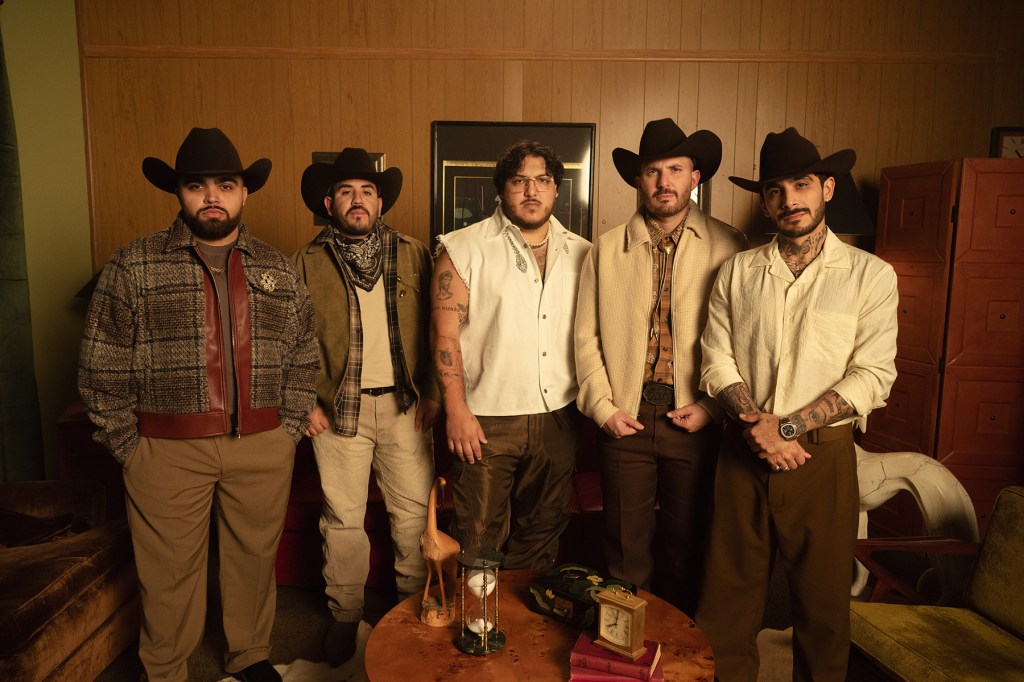genre latin
Page: 5
Trending on Billboard
Six weeks into the run of Taylor Swift’s The Life of a Showgirl blockbuster, we still haven’t seen a new album really challenge it for the top spot on the Billboard 200 — but slightly lower in the top tier, some artists have enjoyed new breakthroughs. One of those comes this week, with Rosalía‘s much-anticipated new album LUX.
Explore
See latest videos, charts and news
The ambitious set arrived with a good amount of hype, based around some of the pre-release buzz and reports (including in Billboard‘s own cover story) that it would feature the Spanish cult-pop star singing in 13 different languages. LUX was immediately met with unanimous critical acclaim, and now has posted the best first-week numbers of her career, bowing at No. 4 with 46,000 equivalent album units.
What does the debut mean for Rosalía’s career? And do we agree with all the rave reviews? Billboard staffers discuss these questions and more below.
1. Rosalía’s LUX album debuts at No. 4 on the Billboard 200 with 46,000 units moved, both career highs. On a scale from 1-10, how excited should she and her team be about that first-week performance?
Leila Cobo: I’d say 11. Here’s an album that defies all parameters: for Rosalía, for music in Spanish, for pop and commercial music as a whole. It’s a complex album, performed in any different languages, by a pop star but in a highly sophisticated classical music format. I don’t know how much Rosalía shared with her team as she progressed through this work, but I have to think there was some concern. Would it work? Would it be too much? Would it be too difficult to consume for the TikTok generation? Would consuming it short-form somehow degrade the product? How the heck do you market this? How do you get people to listen? Yet somehow, all of that resolved. She was able to achieve her highest ever debut with a highly complex work of music. It’s very exciting and unprecedented for both Rosalía and for the music industry as a whole.
Isabela Raygoza: 8 or 9. It’s her best chart placement and biggest first-week sales ever, which is huge. Think about it: breaking into the top five on a chart dominated by global megastars, especially with an experimental, genre-bending album sung in 13 languages? That’s impressive, especially for someone pushing artistic (experimental/operatic) boundaries rather than chasing hit formulas. Sure, it’s not blockbuster numbers like the ones Taylor Swift (110,000 units) or Morgan Wallen (76,000 units) are still posting well after their initial release — but for someone who’s carving her own lane internationally and redefining Spanish-language albums on the global stage, this performance is a major win! It shows her growth, and opens the door for more mainstream recognition while maintaining her artistic cred.
Dan Rys: Probably a 10. She’s always been a cultural force of nature, but hasn’t had the big sales and streaming numbers to back that up — in the U.S., at least, as globally she’s a different story. But no matter which way you cut it, this is a true commercial breakthrough in the States for Rosalía, one that really proves that she can deliver on all the hype and hysteria that surrounds her. Given the reception to the project, it’s not hard to imagine her getting a No. 1 album next time around, depending on how the cards fall.
Andrew Unterberger: Maybe an 8.5. It’s a very impressive debut for a very wide-reaching album, and really shows how Rosalía has built her brand as an albums artist, to the point where fans are more intrigued than put off by the idea of her attempting something so challenging. My score is slightly tempered by the fact that 46,000 is a relatively low unit total for a top five debut — in many other weeks this year, it’d have fallen outside the top five. But then again, the fact that she’s willing to stake her claim now, at a relatively inert time for pop music outside of the absolute biggest names, is arguably just reflective of the boldness she’s operated with her old career.
2. Rosalía had not scored an album in the top 30 of the Billboard 200 before LUX. What do you think is the biggest factor behind this album reaching new chart heights for her? Leila Cobo: First, fans were anxiously awaiting a new Rosalía album. But beyond that, I think the marketing has been absolutely brilliant and major. Perhaps because it was a “difficult” album on paper, the marketing and promotion that went into it was outsized and very thought-out, and it worked brilliantly. The stage was set with the lighting stunt in Madrid to unveil the cover. And then, that very risky proposition of making “Berghain” the first single, and releasing it with that brilliant video, that made a huge impact and got everyone talking. It told the world this was going to be an unapologetically unique album, and you either would experience it or be left out. People chose to discover and propelled her up the charts.
I’d say it’s a combination of the more commercial droplets that bridged her first two albums, the danceable bent of 2022’s Motomami and subsequent world tour, and general anticipation for the Spanish star’s side of her and Rauw Alejandro’s breakup. Also, now that she’s four albums in, it’s practically expected that a new Rosalía album will be a masterpiece. That level of excitement and respect shows in how fervently people tuned in during the album’s debut week.
Isabela Raygoza: I think it’s her growing global recognition paired with the critical acclaim for her unflinching artistic evolution. After El Mal Querer (2018) and MOTOMAMI (2022) established her as an avant-garde force in music — someone fusing flamenco with pop, reggaetón, and experimentation — fans and critics alike have come to expect boundary-pushing projects from her. With LUX, she leaned even harder into high-concept artistry (avant-garde classical pop sung in 13 languages, featuring orchestral movements), which not only attracted devoted fans but piqued the interest of curious listeners eager to hear what she’d do next.
Add in rave reviews and media buzz over her bold exploration of themes like heartbreak, religion, and femininity — plus strategic promotional efforts to highlight the album’s depth, and you have the perfect mix of growth, intrigue, and artistry that made LUX her most successful debut yet. It feels like she’s transcending niche boundaries and turning into a celebrated global name.
Dan Rys: I think this is partially just a natural progression for an artist that has always had a lot of interest around her, and also a really creative marketing campaign. Everything was a little mysterious, a little wink-wink, a little “you have no idea what you’re in for,” and that built a lot of buzz around the release. She only gave fans a glimpse into it with “Berghain” a few days before the full album, and it seemed like that kicked things into overdrive — people didn’t know the context of the song within the broader album, so they were just blown away by the scope of what she was delivering. That song is pure opera and musicality. If anything, the interest went through the roof for what else she was capable of here.
Andrew Unterberger: She’s done a brilliant job of establishing herself at pop’s vanguard — someone who fans want to follow no matter where they go, and whose popularity is almost completely removed from single success. She’s done that through smart collaborations, through a less-is-more attitude towards mainstream exposure, and most importantly, through albums that critics and fans really cherish, with very few obvious compromises in between. 3. Despite the album’s performance and some strong streaming numbers, the set has yet to notch a hit on the Billboard Hot 100. Do you think it ultimately will — and does it matter for her album cycle?
Leila Cobo: Aside from “La Perla” I truly don’t see a Hot 100 song in this album. Everything is a bit esoteric, hard to qualify into a radio format. However, I don’t think this will ultimately matter for the album cycle, and the way Rosalía is promoting it reflects that. For example, the first focus track was “Berghain.” But she performed “La Perla” on Jimmy Fallon and a different track at Spain’s Los 40 Principales award. Clearly she is thinking this is a full work, rather than a series of singles.
Kyle Denis: I think “La Perla” is the album’s best shot at a Hot 100 hit. Perhaps “Sauvignon Blanc” or “Reliquia” could make something shake as well. But a Hot 100 hit doesn’t matter at all for LUX. The album itself could have completely missed every chart and it would still be one of the best and most important projects of 2025. In a year that has forced every player in the music industry to seriously contend with AI on a commercial level, Rosalía’s commitment to human artistry through her album’s sprawling orchestral and linguistic twists is incredibly vital.
Isabela Raygoza: I don’t think LUX needs a Billboard Hot 100 hit to solidify its success during this album cycle — and that’s part of Rosalía’s magic. While she’s proven she can deliver global chart toppers with previous singles like 2022’s “Despechá” (No. 63 on Hot 100) and other hit collabs, LUX is operating on a very different wavelength. It’s not an album designed for mainstream, algorithm-friendly bangers; instead, it’s presenting itself as avant-garde classical pop. The fact that it debuted so high on the Billboard 200, while the single “Berghain” achieved strong streaming numbers — nearly 59 million global Spotify streams in just three weeks — already suggests it’s resonating deeply with fans, even without a Hot 100 presence.
Now, will LUX notch a Hot 100 hit? It’s possible, especially with moments like Rosalía’s performance of “La Perla” on The Tonight Show on Sunday (Nov. 16) — her fairy tale-inspired staging could drive more interest. With 36 million Spotify streams already, “La Perla” (with Yahritza y Su Esencia) has the potential to grow into a sleeper hit if paired with targeted radio pushes, TikTok promotion, or even surprise remixes to give it a commercial edge.
Dan Rys: I don’t know if it will, because the first-week surge in streams is usually indicative of which singles will emerge as chart hits. But that doesn’t mean it doesn’t have a number of songs that could. One of the biggest talking points around the album in the days before release — that she sings in more than a dozen languages across its songs — may ultimately be a deterrent in the race for a true hit, while the wild musicality of “Berghain,” impressive as it is, does not scream “chart-topping success.” But in a vacuum, a song like “Sauvignon Blanc” is a gorgeous, delicate pop ballad — Adele would be celebrated for it. “La Perla” is capable of reaching mass appeal with its waltz-like rhythm and inviting instrumentation. “Reliquia,” “Porcelana” — these songs don’t sound like anything else right now and are worthy of hit status. But will they reach the Hot 100? I’m not so sure.
Andrew Unterberger: Based on the early returns and showcase moments “La Perla” definitely feels like it could get there. But it might not. This album might not produce a hit. Or, it might not produce a hit for seven years, until some song unexpectedly hits viral gold and becomes the late-appreciated “Ribs” or “Party 4 U” from this set. Or, she could give one of the most memorable performances in Grammy history and have a song go top 10 the next week. It’s all possible with this set, and none of it really matters: Whatever this album’s legacy ultimately ends up being, its Hot 100 presence (or lack thereof) will ultimately play a pretty small part in it.
4. LUX has earned a 97 on review-aggregating site Metacritic, the highest score of any 2025 album. Do you think it earns its immediate and unanimous praise? Leila Cobo: I do. And I don’t say this lightly. I’m a classical pianist with a degree in piano performance and I listened to this album in a very critical fashion. While it’s sometimes confounding, the risks that it takes are worth the listen, especially at a time when music has become so watered down, so much a product that chases the platforms, that much of it is truly disposable. This album forces you to take a different route.
Kyle Denis: Yes. I can think of maybe three mainstream pop stars who could pull off something as impressive and as meticulously curated as LUX.
Isabela Raygoza: Wow, that’s an A+ — and it feels well deserved. She clearly took her time (three years) crafting LUX as a very intentional and thought-out album, not just releasing material for the sake of putting music out like so many artists today. It’s ambitious, and pushes boundaries — all while keeping her voice and vision at the core. It’s the kind of album that earns unanimous praise because it raises the bar for what pop music can be.
Dan Rys: Not to dodge the question entirely, but I think that an album finds its audience, rather than earning or deserving one. But having said that, I think that this album was largely received so well by that audience because of its sheer scope — it feels like she put three years of work into it, and the end result is just stunning in myriad ways. In an era when some artists are cutting multiple songs in a day off the top of their head without thinking too much about quality and process, it stands out for its ambition and its dedication to its own curiosity. When you can really tell someone has put an enormous amount of work into a piece of art and the result sounds so majestic and expansive and limitless? Then yeah, maybe it has earned that praise.
Andrew Unterberger: Surprisingly so, yeah. I was left pretty cold by “Berghain” ahead of its release, so I was definitely worried that this was going to be a moment I was going to have to view curiously from the outside. But not only do I really like most of LUX, “Berghain” sounds so much more explosive and transfixing in full album context as its centerpiece that I’ve come around on that too. I still don’t love the whole thing yet, but I do love more of it with each listen, and I’m excited by an album that intrigues and captivates without showing its full hand the first time out. 5. Rosalía is a two-time Grammy winner, but has never been nominated for album, song or record of the year. Obviously LUX was released too late for this year’s Grammys cutoff — do you expect it to be one of the main contenders in the general categories at the 2027 awards?
Leila Cobo: I would be very surprised if it doesn’t get an Album of the year nod, especially in the wake of Bad Bunny’s nomination this year. I don’t say that because the two albums are similar, because they aren’t at all. But because the Academy clearly is allowing music in other languages to finally enter the competition for album, song and record of the year. Also, LUX has been so completely acclaimed at all levels of the industry — from mainstream media to Latin media, from fellow artists to well-known critics and cultural writers — that not including it would seem preposterous. As far as record and song of the year, I wouldn’t wager on that yet.
Kyle Denis: I think her and Olivia Dean (The Art of Loving) have already secured their spots in the 2027 album of the year Grammy lineup.
Isabela Raygoza: This is a conversation I’ve already had with my editor and it’s a strong YES. I’d be surprised if LUX wasn’t a major contender in the general categories at the 2027 Grammys. Its critical acclaim, Billboard 200 placement, and ambitious artistry make it a strong candidate for album of the year, IMO, while songs like “Berghain” could easily find recognition in record or song of the year. The fact that Rosalía chose to release LUX after the Grammy cutoff date is commendable — it shows she prioritized crafting a thoughtful, intentional album over rushing to meet deadlines, which is refreshing in an industry where we’re often bombarded with hurried releases. That level of care makes it feel even more deserving of top honors.
Dan Rys: I’m not sure if it will, though that’s more a reflection of the Grammy process than the quality of the work. Song and record of the year nominees often skew towards hits with at least some commercial success, and as we’ve noted earlier this isn’t likely to have one big song that emerges from the overall album, which is probably more a testament to how cohesive the project is as a whole. Album of the year could be a different story; each year there are at least one or two left-field or outlier picks that nod to pure musical achievement as opposed to chart-topping success or a mix of the two, and Jon Batiste even took home the trophy in 2022 for the No. 25-peaking We Are, so there’s recent history there. But there’s also an awful long way to go before we get there.
Andrew Unterberger: Again, surprisingly so. You certainly wouldn’t write it in permanent marker just yet — it’s still incredibly early in the Grammy year, and sometimes releases like this that seem initially momentous lose momentum and attention quicker than you expect. But given the unanimity of the critical praise, the narrative hookiness of its backstory, the relative familiarity (and continued Grammy success) of Rosalía as an artist and the fact that Bad Bunny really has opened things up for Spanish-language artists being recognized at the awards’ highest levels, I’d feel pretty comfortable already calling her a likely AOTY nominee, and song and record don’t feel like big reaches either.
Trending on Billboard Arcángel announces his new album, LA 8va Maravilla, and reveals a new collaboration with Grupo Firme. Arcángel: To the eighth wonder. That’s why this trip we took, visiting the seven wonders, was so special. And within this experience, it’s important to tell people who think that there are only seven wonders that […]
Ozuna, the Grammy-winning Puerto Rican-Dominican música urbana artist, is expanding his empire with the launch of Mucho, a bilingual, video-first media company. According to its website, Mucho is aimed at “amplifying the voices of young US Hispanic audiences” through streaming, talent-driven entertainment, and festivals. The new venture officially kicks off on Tuesday (Nov. 18). Related […]
Trending on Billboard Grupo Frontera announced on Tuesday (Nov. 18) dates for its Triste Pero Bien C*abrón Tour, which kicks off March 28 in Nuevo León, Mexico, and will then make stops in South and Central America and also in Europe. The 27-date stint — Grupo Frontera’s most ambitious trek yet since its 2024 Jugando […]
Trending on Billboard Trueno talks on working with Young Miko and going on tour with Damon Albarn. Trueno: Well, precisely, the collaborations I have are with two friends, one female and one male, who I consider to be two of the strongest hip-hop representations that Latin America has to offer. Young Miko is a beast, […]
Trending on Billboard
Music executive Ángel Del Villar will remain a free man while he appeals his convictions for doing business with Mexican drug cartels, a federal judge said.
Del Villar was scheduled to report to prison on Dec. 1 to begin serving his four-year prison sentence on the cartel-ties convictions, but Judge Maame Ewusi-Mensah Frimpong granted his request to stay out on bond during the appellate process. Such appeals can take a year or more to resolve.
Related
Siding with arguments last month by Del Villar’s attorneys, the judge said the convicted executive had cleared the low bar for remaining free: that his appeal raised sufficiently arguable points about her jury instructions that an appellate court might be persuaded.
“Del Villar need only show that his appeal raises a fairly debatable question,” Judge Frimpong wrote. “The Court finds that—although the Court does not see any error in its trial rulings or in its jury instructions—that at least the question of the deliberate ignorance instruction is a ‘fairly debatable’ one.”
Del Villar, who founded his Del Records in 2008, built the label into a powerhouse for regional Mexican music, home to supergroup Eslabon Armado, Lenin Ramirez and other chart-topping artists.
But in June 2022, federal prosecutors unveiled charges against Del Villar, 41, CFO Luca Scalisi, 56, and Del Records under the Foreign Narcotics Kingpin Designation Act – a statute that allows the U.S. to impose targeted sanctions on foreign individuals involved in the illegal drug trade and ban U.S. residents from doing business with them.
The feds claimed that Del Villar had repeatedly arranged concerts with Jesus Pérez Alvear, a Guadalajara-based promoter with cartel ties. And at a March trial, superstar Gerardo Ortiz took the stand to testify against Del Villar, saying he had seen Pérez Alvear at the Del Records offices and had himself performed at one of the promoter’s concerts.
Related
Del Villar’s defense attorneys argued back that he had been “manipulated” into working with Pérez Alvear by a “trusted” former employee. But the jury didn’t buy it, finding him guilty on 10 counts of violating the Kingpin law, as well as one conspiracy charge. In August, Judge Frimpong sentenced him to 48 months in prison on those convictions.
With that sentence looming and his appeal still in the earliest stages, Del Villar’s attorneys urged the judge to postpone his December prison report date. In the process, they also previewed how they will likely challenge the verdict on appeal.
They say they have a particularly strong argument on how the judge instructed jurors that they could convict Del Villar by finding that he willfully blinded himself to Pérez’s shady connections. They say prosecutors couldn’t prove he took concrete actions to avoid such knowledge, but that Judge Frimpong gave the jurors that option anyway.
“The government pointed to no evidence — and the record contains none — from which a jury could conclude beyond a reasonable doubt that Del Villar took ‘deliberate actions’ or made ‘active efforts,’ his lawyers wrote, later adding that the judge’s instruction “went to the heart and most hotly contested aspect of the case.”

Trending on Billboard Rosalía appeared on The Tonight Show on Sunday night (Nov. 16) to deliver a captivating performance of “La Perla,” drawn from her latest album, LUX, originally featuring Yahritza y Su Esencia, who were not present for the performance. Explore See latest videos, charts and news The Spanish superstar stunned as she brought […]
Trending on Billboard
Pop star Chappell Roan turned to Duolingo to surprise her fans with some Spanish during her debut in Mexico on Saturday (Nov. 15) night at the Corona Capital festival.
“¡Hola, buenas noches! Me llamo Chappell Roan,” said the singer-songwriter to the 75,000 people (according to promoter Ocesa’s figures) gathered around the main stage at the Autódromo Hermanos Rodríguez in Mexico City. “Are you ready to get ‘Naked in Manhattan?’” she added in English, referencing her song of the same name.
It was the prelude to a grand celebration filled with the dance and synth-pop hits that have made the young singer one of the most celebrated stars today.
Later, seated on a giant throne while holding a gremlin-shaped toy, she revealed more about her attempts to learn the language. “I’m on day 55 of my Duolingo for Spanish, and I practiced saying that sentence in Spanish, and I’m too embarrassed to try and speak it,” she said shyly before performing “Coffee.”
Hundreds of fans responded by chanting “¡Sí se puede!” (Yes, we can!) in unison to try to encourage her. “Chappell, sister, you’re already Mexican!” shouted another group of supporters to applaud her effort, also in Spanish.
On several occasions, Roan interacted with the audience that eagerly awaited her during the marathon day of the musical feast, which also marked the 2025 closing of her Visions of Damsels & Other Dangerous Things Tour, a title that is reflected in her fairytale gothic aesthetic.
“I was really nervous to play this show because I’ve never played in Mexico before,” she confessed. “I wasn’t sure, honestly, what the turn out was gonna be, so I’m glad, thank you for showing up, and this is so awesome!”
Throughout the performance, the singer was literally the queen of a castle that filled the stage. Her often theatrical performance reached a surreal climax when the 27-year-old artist also paid homage to the famous Mexican celebration of Día de Muertos (Day of the Dead), which is held on Nov. 1 and 2 to honor deceased loved ones.
“I wanted to be a screaming banshee, and so I was like, Il’l be scary cause I feel like Mexico City can handle it,” the artists said. “I literally think this is the only place that can handle me looking like this,” she added about her outfit: a bridal gown with veils and lace, her mouth and teeth stained red to simulate blood. (Banshees are female spirits from Irish folklore, described as messengers of death whose wailing or screaming announces the passing of a close relative.)
An enthusiastic audience sang along to every word of her hits, from “Pink Pony Club” to “Good Luck, Babe.” Even the unreleased single “The Subway” and her cover of Heart’s “Barracuda” were a resounding success. The emotion conveyed by the 2025 Grammy winner for best new artist brought tears to the eyes of many of her fans, who expressed their gratitude for her visit. Roan is set to visit other Latin American countries in 2026 when she participates in the Lollapalooza festivals in Chile, Argentina and Brazil.
The second day of activities at the Corona Capital festival also included performances by acts such as Vampire Weekend, Aurora, Marina, Mogwai, Alabama Shakes, Jehnny Beth, Haute & Freddy y Half-Alive. Italian star Damiano David canceled his participation last minute due to health reasons, according to a statement released on his social media.
The program was set to continue on Sunday with Linkin Park, the much-anticipated return of Deftones to Mexico, James, AFI, Weezer, Jerry Cantrell, TV on the Radio, and more.

Trending on Billboard
The first day of the 2025 Corona Capital festival took place on Friday (Nov. 14), marking the grand return of Foo Fighters to Mexico City after a three-year absence. The explosive and unforgettable performance turned into a celebration filled with hits from Dave Grohl’s rock band’s 30-year career.
On day one, the musical feast — which is celebrating its 15th edition — was filled with 1990s nostalgia but also showcased new talents from genres like indie, soul, electro-pop, and folk. It drew over 78,000 attendees (according to promoter Ocesa) who enjoyed performances by Queens of the Stone Age, Franz Ferdinand, Garbage, Kaiser Chiefs, 4 Non Blondes, Jet, Lucy Dacus, Bad Bad Hats, Debby Friday, and other acts. The audience, demanding yet warm, kept the energy and good vibes throughout the day, which stretched into the early hours of Saturday at the Curva 4, the Formula 1 venue in Mexico City.
One of the surprises this year was the performance by veteran band 4 Non Blondes, who won over both old and new fans following the viral trend of the Nicki Minaj mash-up “Beez in the Trap” fused with “What’s Up?” The new song has been used in hundreds of thousands of TikTok videos and brought the ’90s anthem, written by singer-songwriter Linda Perry, back onto the Billboard Hot Rock & Alternative Songs chart.
The program continues on Saturday (Nov. 15) with performances by U.S. star Chappell Roan, whose appearance at Corona Capital marks her debut on Mexican stages, as well as shows by Vampire Weekend, Damiano David, Aurora, Mogwai, Alabama Shakes, Jehnny Beth, Haute & Freddy, Half-Alive, and more.
Find out which were our favorite five acts from the first day of the 2025 Corona Capital festival below.
Foo Fighters, the Best of the Best
Trending on Billboard
Edgar Barrera, composer and 24-time Latin Grammy winner, says that finding the next hit is a rush of adrenaline. He recently sent Carín León a song that he’s incredibly excited about.
Edgar Barrera: I think it’s the result of a whole year of a lot of work. A few days ago, we were talking about that, about how I keep a calendar where I schedule all my sessions and log the songs I write every day. On my way here, I was looking at the calendar. Everything in it, it’s just packed. I’d turn the page and see the whole month, and every single day there would be one song, two songs, sometimes even three songs created in a single day.
I think it’s something people don’t often see. They don’t see the effort and work that happens behind the scenes. So, when these nominations come out, when I receive ten nominations, it’s because I’m in the studio all day, almost every day, writing one, two, or even three songs daily, just like I’m telling you. Every week, every month, I collaborate with different artists like Peso Pluma, Frontera, Carín León, just last week, I was working with Carín León. It’s this crazy pace. I was with Carín for three days, and in that short time, we recorded seven songs. It’s a result of relentless effort, I think.
Seven songs in how much time?
In just three days. Actually, there were nine songs. Two of them were pre-written, and together we created seven more during those days.
Incredible. Honestly, the process of creating songs seems so fascinating to me—the way you guys handle it. But obviously, when you first started teaching and sharing your songs, how many songs did you already have?
When I began sharing my songs? Well, I’ve always written music. I’ve been making music since I was around fourteen or fifteen years old, just writing and writing. It’s something I’ve been passionate about for a long time.
Keep watching for more!

 State Champ Radio
State Champ Radio 







